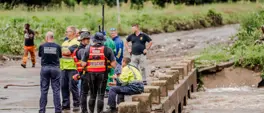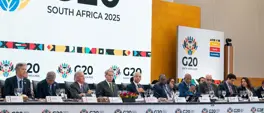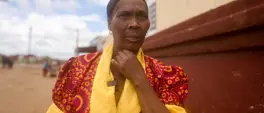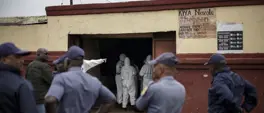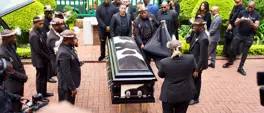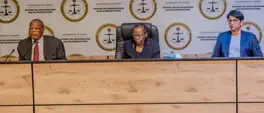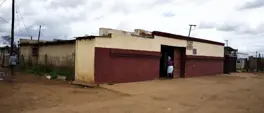MALAIKA MAHLATSI: Politicians scapegoating foreign nationals for crime levels to absolve govt of its own complicity
Malaika Mahlatsi
15 April 2024 | 10:10Politicians like Bheki Cele have caused untold harm to the migrant community in South Africa by cementing a false narrative that foreign nationals are responsible for high levels of crime, writes Malaika Mahlatsi.
A week ago, Police Minister Bheki Cele addressed the media on the demographics of South Africa’s prison population. According to Cele, there are approximately 158,000 people held in our country’s prisons, translating to a prison population rate of 258 per 100,000 of the national population of 60.94 million.
Of the 158,000 people held in our prisons, foreign nationals constitute just 14,000 of the prisoners – less than 10% of the total prison population.
This is a decline from 2021 figures, where the percentage of prisoners who were foreign nationals stood at 10.5%, according to the World Prison Brief published by the Institute for Crime and Justice Policy Research at the University of London.
These statistics confirm an argument that researchers, including me, have been making for a long time - that foreign nationals are being made scapegoats by the South African government when it comes to the issue of crime, just as they’re made scapegoats on the issue of unemployment.
For many years, politicians in our country have been going around making unfounded statements about foreign nationals being responsible for the high levels of crime in South Africa.
This narrative has become so deeply embedded in the minds of our people that many genuinely believe in its authenticity, despite the complete lack of data corroborating it.
In October 2023, at a press conference following the Provincial Executive Committee (PEC) meeting of the African National Congress (ANC) in Gauteng, the party’s provincial secretary, Thembinkosi “TK” Nciza, and chairperson, Panyaza Lesufi, who is also the Premier, raised the issue of immigration as one of the biggest challenges confronting the province.
Under the guise of challenging illegal migration, the ANC provincial leaders perpetuated the narrative that migrants, particularly those who are undocumented, are responsible for the high unemployment rate, as well as the soaring levels of crime in Gauteng.
Minister Cele has also been one of the politicians who have been at the forefront of entrenching this problematic narrative.
Just two years ago, after leading a law enforcement operation in Durban, where several undocumented foreign nationals were arrested at a building on Mahatma Gandhi (Point) Road as part of the “Safer Festive Season” launch, he stated that areas where there are many foreign nationals are crime hotspots, even outside the festive season.
This was not the first or last time that Cele would make this accusation.
Just a few months ago, following the commencement of Operation Shanela in the Johannesburg central business district, he implied that foreign nationals were at the centre of the illegal trade of unregistered medicines.
He went on to say: “When they commit a crime, they give police difficult work to check and chase those people who have no fingerprints, no DNA, and all that. But one thing that takes us back on this matter, every stall in these streets is foreign nationals, and mostly those foreign nationals are illegal, hence, when you come, they shut them and run when they see the police”.
This argument posed by Cele has been accepted by many South Africans as an indisputable fact.
Even now, with the government’s own statistics clearly challenging the narrative that foreign nationals are the primary source of criminality in our country, most people in our country still believe that foreign nationals are principally responsible for high levels of crime, and that the only reason their prison numbers do not reflect this is because they are untraceable.
There’s a sense of disbelief that there are, in fact, more criminals who are South African nationals than those who are foreign nationals. Politicians such as Cele have played an instrumental role in cementing this idea. In doing so, they have deepened the conflict between South Africans and foreign nationals, with the former seeing the latter as parasites who are in our country to cause destruction.
This couldn’t be further from the truth.
I am part of a reference group on the Mapungubwe Institute for Strategic Reflection (MISTRA) priority research project on migration. My research is focused on the social and economic impact of the migrant tenant community in the township of Soweto.
Some of the results from my research, which was conducted in Soweto over a period of time, demonstrate that the migrant community has played an instrumental role in the development of the township economy and in other aspects of social development.
Despite a history of xenophobic violence, townships also serve as an important case study on the dynamic ways in which migrants and locals have co-existed in a mutually beneficial relationship. But this narrative has been suppressed by one that positions foreign nationals as criminals.
Politicians like Cele have caused untold harm to the migrant community in South Africa by cementing a false narrative that has no basis in scientific fact.
So significant is the damage that even in the face of factual data, ordinary South Africans refuse to accept the fact that crime in our country is a function of systemic and systematic constructs. They refuse to accept that crime is not a question of nationality because in doing so, they would have to accept the difficult truth that South Africans are the architects of the state of our nation.
It is much easier to blame foreign nationals because in doing so, we can continue to be xenophobic with impunity. But more than this, for politicians, when we blame foreign nationals for crime, unemployment and other issues, we absolve the government of its own complicity.
And this is the real danger with the “foreigners are responsible for crime in South Africa” narrative. It absolves the government from its failures, at the centre of which is the failure to address the structural inequalities and institutional failures that reproduce high levels of crime. The scapegoating of foreign nationals must not be accepted.
Politicians such as Cele, whose inflammatory and false statements pathologise immigrants, must be held accountable.
If we let them continue with this recklessness, we will be setting parameters for the normalisation of the persecution of foreign nationals.
Malaika is a geographer and researcher at the Institute for Pan African Thought and Conversation. She is a PhD in Geography candidate at the University of Bayreuth in Germany.
Get the whole picture 💡
Take a look at the topic timeline for all related articles.

